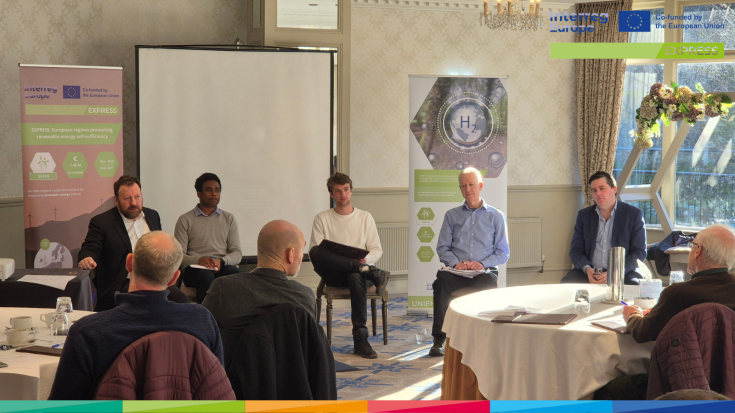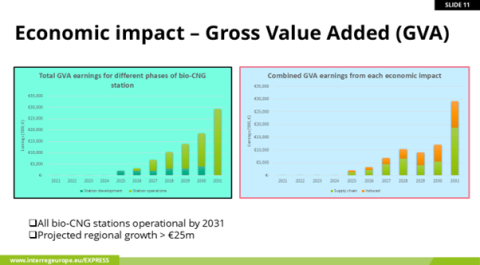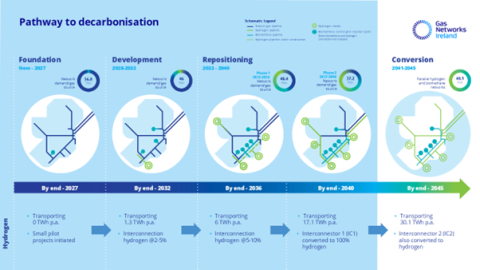Ireland | Bioenergy Meets Green Hydrogen

The South East Energy Agency hosted its first joint stakeholder meeting for the EXPRESS and UNIFHY projects, co-funded by the EU, on November 27, 2024, in Kilkenny City. The event brought together industry leaders, policymakers, local authorities, and community stakeholders to discuss the potential of bioenergy and green hydrogen in advancing the energy transition in South-East Ireland.
Economic Prospects for Bioenergy in South-East Ireland
Project officer Stephen Oba presented the EXPRESS Project, which focuses on Regional Policy Objective 98 (RPO 98) to support the development of a Regional Renewable Energy Strategy. Key priorities include enhancing renewable energy resource development and improving stakeholder engagement and communication.
Oba shared the current state of Ireland’s renewable energy targets, highlighting the potential of bioenergy projects and their economic impact, particularly on employment. He noted that bioenergy could create 240 green jobs, achieve a 15% CO₂ reduction, establish 19 new bio-CNG stations, and meet 47% of the region’s energy needs.

Enabling Green Hydrogen Solutions
Speaking on the importance of green hydrogen and its potential in Ireland, UNIFHY Project Officer Martin Desgrandchamps gave an overview of the project. UNIFHY seeks to support the adoption of green hydrogen and biogas by providing technical and financial assistance.
Desgrandchamps emphasised the need to build partnerships to turn potential into real-world results, overcome regulatory and infrastructure barriers, and collaborate across sectors to drive solutions and policy innovation.
The South-East region has strong potential for green hydrogen production, particularly due to its agricultural feedstock for biogas, renewable energy resources, and the Waterford Renewable Energy Strategy.
Regional Policy Development for Biogas and Hydrogen
Dominic Walsh, Regional Planning Officer for the Southern Regional Assembly (SRA), outlined the SRA’s vision to make the Southern Region one of Europe’s most innovative, sustainable, and livable areas by promoting resilience, inclusion, and economic growth.
Walsh accentuated the revised National Planning Framework (RNPF), which underscores the role of the circular bioeconomy in reducing carbon footprint and emphasizes biomethane’s potential. Each region will develop a Regional Renewable Energy Strategy (RRES) to set targets for onshore wind and solar projects.
He also noted that inputs from the EXPRESS and UNIFHY projects will contribute to regional policy updates. In Walsh’s words, “SRA supports these projects and their work in the development of green hydrogen and the broader strategic objectives of the EXPRESS Project.”
Transition of Ireland’s Gas Supplies
Pádraig Fleming, Biomethane Programme Manager at Gas Network Ireland (GNI), outlined a pathway to decarbonization and GNI’s role in Ireland’s energy system.

Fleming outlined plans to convert the Galway-Dublin pipeline and establish a National Hydrogen Ring, with biomethane covering 25%-30% of national gas demand and hydrogen meeting the remaining 70%-75%. GNI is prepared to implement a 2% hydrogen blend, ensuring compatibility with existing infrastructure and supporting Ireland's National Hydrogen Strategy Action Plan.
Key on GNI’s agenda is developing industrial clusters, starting with hydrogen clusters—regional networks of businesses and applications involved in the hydrogen industry.
Bioenergy Boost: The Policy Shifts We Need Now
In relation to increased use of bioenergy and policies needed, the CEO of Irish Bioenergy Association (IrBEA), Sean Finan, spoke on the crucial role of bioenergy in the world, stressing that this is the largest source of renewable energy in the EU.
Finan introduced the Biomass Harvesting Document (2024), which aims to increase biomass resources for renewable energy, enhance site productivity, and protect biodiversity. He expressed optimism about bioenergy’s growing role in transportation.

He also called for key policy and regulatory changes, including stronger enforcement mechanisms, greater promotion of biomass and biofuels, and investments in workforce training and upskilling.
“The government must provide the necessary policy and conditions to attract investment and ensure the long-term viability and financial sustainability of the biomethane sector", said Sean Finan.
In conclusion, the forum provided a platform for stakeholders to discuss policies, investments, and innovations that will drive renewable energy development in the region. Participants gained practical knowledge and established connections with like-minded professionals, working together toward a sustainable energy future.
